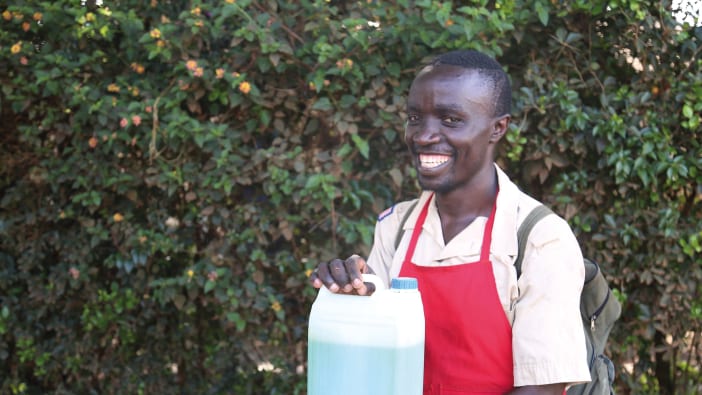These examples give some idea of the variety of approaches in primary health care, looking in particular at the selection and training of community health workers, community involvement and funding.
With many thanks to those who helped provide this information.
1. Gahini Community Health Project, Rwanda
CHWs
The CHWs receive an initial three week training based at the local hospital, followed by one day refresher courses every two months. The CHWs are not paid, but their families have free medical care. They are also excused the one morning a week of obligatory community service.
Community
The community selects the CHWs. They are regarded with respect, though people are often reluctant to follow their advice. In this area, people are not grouped into villages, so there is very little sense of community. Also, the CHW tends to be seen as belonging to the hospital, not to the community.
Funding
The project is very dependent on outside funding, from one overseas donor.
Other
We try to discuss situations together encouraging the CHWs and community to identify their problems and priorities and to seek their own solutions. This can be a slow and frustrating process, but will help the community to become gradually less dependent on foreign aid.
2. Prem Sewa Hospital, Utraula, India
CHWs
Training of CHWs is linked to the hospital. Training is given by Field Supervisors, who then supervise the CHWs in the community.
Community
Meetings to discuss development are poorly attended. The lack of support is very discouraging.
Funding
It is hard to encourage any financial support of the health work which will be vital when the present five year overseas funding finishes.
Other
The village health work is a recent development. People are used to the services provided by the hospital and it is very hard to change their outlook.
3. Burtibang Community Health Project, Nepal
CHWs
They are selected by Village Service Committees. Training is usually done in the villages. If training is given at the offices, then an allowance is paid due to the walking distances involved. After training, the CHWs are provided with an initial stock of medicines and basic instruments. They are supposed to charge a small fee when treating patients.
Community
The community values the work of the CHWs. Improvements in health are linked with the provision of clean drinking water, improved diet through animal health and agriculture, and literacy. Government basic health staff also receive our training.
Funding
This is all provided by three overseas agencies.
Other
The local church has no involvement with the work. Health is not seen as a priority here. Also, people in Nepal expect health services to be free of cost, since this has been Government policy. To change these attitudes will take time and effort. I believe there is money available, even in the poor communities, since a lot of money goes to the witch doctors.
4. Adiokor Rural Clinic, Ghana
CHWs
Traditional Birth Attendants (TBAs) and most CHWs do not receive salaries. It has been taken for granted, particularly by Christians, that this work is sacrificial.
Community
There is good community support of our health workers. They are selected and paid for by the community members themselves. People regard them very highly within the community. Many of the health workers, especially the dedicated Christians, receive a lot of gifts from the community to supplement their income.
Funding
Training is provided by the Government. We receive funding from some overseas agencies as well as the Government and community.
Other
The local churches often invite our CHWs to give health talks and organise meetings.
5. Chandraghona Christian Hospital, Bangladesh
CHWs
Health workers are selected by the local committee. Training is mostly provided by one expatriate trainer (with 17 years experience and well accepted by the community) with some help from visiting specialists in the hospital. A training session of one or two days is held every six months. The CHWs are paid a wage.
Community
The health care work is well established and appreciated by the community. Clean water and sanitation, literacy work with women and income generation have been part of the work.
Funding
No financial support is given by the community. Funding and training is provided by four overseas agencies. Local income is raised through our income generating scheme, fees at Under Fives clinics and also the sale of locally produced health books.
Other
The work is based in the hospital and most staff are Christians, though not all the health workers.









